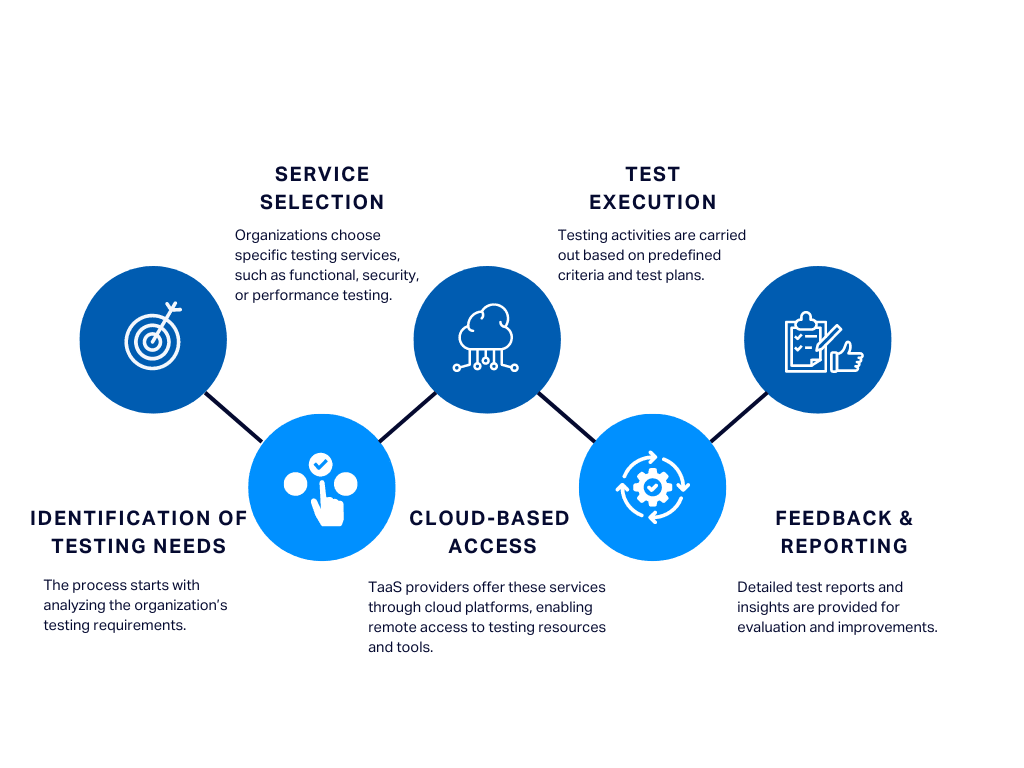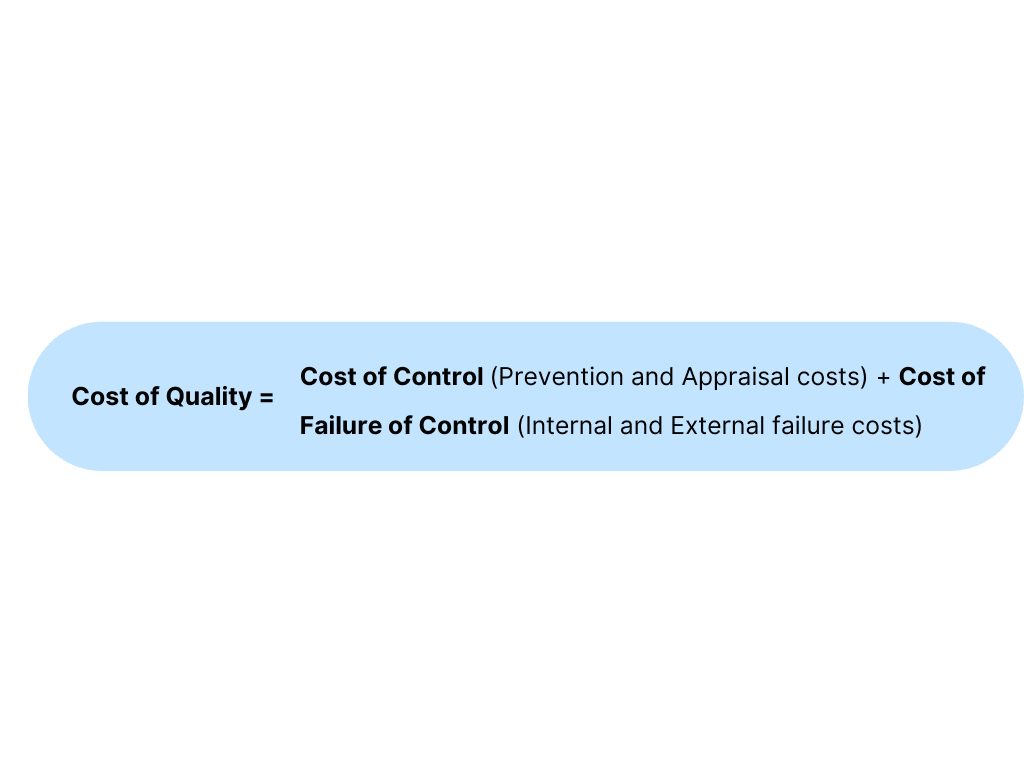A Complete Guide to Testing as a Service
Testing-as-a-Service (TaaS) is rapidly gaining popularity growing at a compound annual growth rate (CAGR) of 14% from 2024 to 2030. Organizations adopting TaaS report up to 30% cost savings compared to traditional in-house testing.

Engineers and product managers face the challenge of balancing speed, quality, and cost in software testing as technology continues to evolve rapidly. To address these challenges, many are shifting to Testing-as-a-Service (TaaS).
This outsourcing model uses expert partners to scale testing capabilities dynamically without requiring extensive in-house resources. This approach supports quick deployment cycles and improves test precision and scalability.
In this article, we will explore testing as a service, explain the reasons behind adopting TaaS, and provide recommendations for selecting the right partner to take your software testing to the next level.
What is Testing as a Service?
Testing as a Service (TaaS) is an outsourcing model in which a company hires a third-party provider to handle its software testing activities. This approach uses cloud-based technology, allowing organizations to access a variety of testing services on demand.
Before software products can be released to the market, they must be tested—a software engineer tests for various real-world scenarios. A TaaS model enables companies to outsource these tests to a dedicated team so that their development teams can concentrate on building their products.
Below is an illustration of how TaaS works:

What Is Driving the Need for Testing as a ServiceTaaS?
Testing as a Service (TaaS) addresses challenges in traditional testing and enables them to adapt quickly to emerging technologies and market demands for modern enterprises.
Here are some key drivers increasing the adoption of TaaS:
Accelerated Development Cycles
Development teams face intense pressure to shorten development cycles and release updates rapidly to maintain a competitive edge. TaaS offers flexible, scalable, and rapid testing services that adapt to changing requirements without the lengthy lead times often associated with in-house setups.
Distributed Device Coverage
Testing every device/OS combination isn’t feasible or efficient for internal teams. TaaS offers access to global devices and testers, allowing companies to achieve more complete coverage than relying solely on their internal teams.
Cost Efficiency
Traditional testing infrastructures require significant upfront investments in hardware, software, and personnel. TaaS transforms these fixed costs into variable costs, providing a pay-as-you-go model that aligns better with business cycles and usage patterns. In this model, quality is not compromised at the expense of cost efficiency.
Expertise and Advanced Technologies
Keeping up with the latest testing methodologies can be challenging for internal teams, especially when core development takes precedence.
TaaS providers bring specialized expertise and advanced tools, ensuring that testing services are up-to-date as well as compliant.
Global Reach
TaaS platforms offer access to testing services worldwide, overcoming geographical limitations. This global reach is particularly beneficial for businesses operating in multiple markets or planning international expansion.
Focus on More Strategic Priorities
Outsourcing testing to TaaS providers allows companies to redirect internal resources toward core business activities and innovation. This strategic shift can improve competitiveness and enable faster responses to market opportunities.
Scalability and Flexibility
TaaS offers unmatched scalability, allowing businesses to adjust testing resources according to project size, workload fluctuations, and market changes. This flexibility eliminates the resource management burden, making it easier to manage diverse project demands.
What is The Economic Impact of Testing-as-a-Service?
QA trends come and go, but what really matters is definitive ROI. Testing-as-a-Service (TaaS) is a trusted solution that helps companies significantly lower software failure costs.
Every software developer needs to evaluate their product before bringing it to market. Testing allows companies to stress test their product, eliminating possible downtime or faulty functions. It also helps to identify and eliminate security vulnerabilities that could affect users.
Let us now examine the major factors involved in testing and the economic impact of Testing-as-a-Service.
Costs of Testing
Testing incurs costs, from building and maintaining testing environments to the less obvious costs, such as opportunity costs when developers aren’t developing. A security breach can also lead to incalculable costs to a brand’s reputation. The following factors play an essential role in reducing costs:
- Cost Efficiency: TaaS helps companies reduce costs associated with maintaining in-house testing infrastructure and hiring specialized personnel. By outsourcing testing, businesses can leverage the expertise of dedicated testing teams without the overhead costs.
- Scalability: TaaS offers scalable solutions that can adapt to the varying needs of a project. This flexibility allows companies to manage testing resources more efficiently, scaling up or down based on project demands.
- Quality Assurance: Access to specialized testing services ensures high-quality software products. TaaS providers bring in-depth knowledge and experience, which can lead to more thorough and effective testing, reducing the risk of software failures and associated costs.
- Focus on Core Activities: By outsourcing testing, development teams can focus on core activities such as innovation and product development, rather than being bogged down by testing processes.
- Risk Mitigation: Effective testing helps identify and mitigate potential issues before they reach the end-users, thereby protecting the company’s reputation and avoiding costly post-release fixes.
When Cost is a Factor, Outsourcing is the Best Option
Outsourcing cost centers is a strategic move for many companies due to the unpredictability of market demand, the resources required, and the flexible nature of these services. By outsourcing, companies can limit their financial outlay and adapt to changing demands more cost-effectively.
In the case of Testing-as-a-Service (TaaS), there are additional benefits, including access to specialized testing expertise.
The Value of Outsourcing Testing
When developers handle testing, whether in UI/UX or security, they often have blind spots because they know how the system is supposed to work. An external perspective is extremely valuable for identifying issues that internal teams might miss.
Consider this analogy: you could have the contractor who built your house install a security system, but they aren’t security experts. A specialized security firm would be better equipped to identify and address security flaws that the contractor might overlook.
Understanding the Cost of Quality (COQ)
CEOs and Product Managers need to consider the Cost of Quality (COQ), defined by QAI as the money spent beyond expected production costs (labor, materials, equipment) to ensure the product delivered to the customer is defect-free. COQ includes prevention, appraisal, and correction or repair costs.
Here’s how COQ is calculated:

Companies must evaluate the potential costs of security risks or poor user experiences if minimal testing is done. These costs can be challenging to quantify and often increase as the company grows and adds more users, thereby increasing failure costs.
Recommendations for Selecting the Right Provider
Choosing the right TaaS partner is like building a great team because your partner will be an extension of your own team and can heavily influence the effectiveness of your software testing.
Selecting the wrong provider can lead to problems like poor communication, security issues, and disruptions that add more work for your team, defeating the purpose of adopting TaaS.
To ensure your chosen provider fits well with your organization’s needs and goals, focus on these important factors:
- Expertise and Reputation: Evaluate the provider’s expertise in your preferred testing methodologies and industry. Look for a proven track record of similar successful projects. Check references and request case studies to verify their capabilities.
- Technology and Tools: Ensure the provider continually adapts their tech stack and uses advanced, up-to-date testing tools and methodologies. Verify that their tools integrate seamlessly with your existing systems and workflows.
- Regulatory Compliance: If security and compliance are priorities, evaluate the provider’s security protocols to ensure data integrity and confidentiality. Ensure the provider complies with relevant industry standards such as ISO, GDPR, or HIPAA.
- Dynamic Staffing Solutions: A good TaaS provider should offer flexible staffing solutions, allowing you to scale your testing team up or down as needed. This adaptability is crucial for handling changing project requirements without being locked into inflexible contracts.
- Communication and Support: Look for providers that offer open communication channels, regular updates, and detailed reporting. Ensure they provide dedicated client services to support your needs throughout the partnership.
Testing as a Service with Testlio
Integrating Testing-as-a-Service (TaaS) into your software development process is a strategic move that can significantly improve your team’s capabilities. Using a TaaS company makes it easier to assess the Cost of Control part of the equation, leading to a more accurate project budget.
It’s also highly recommended to have these costs calculated by someone outside of the development team, such as a Controller or another Product Manager without a vested interest in the product.
Therefore, by partnering with a reputable TaaS provider like Testlio, you can optimize the technical aspects of testing and boost your team’s efficiency.
We offers customized and flexible solutions backed by a global network of expert testers, ensuring your projects are handled with the utmost precision and care, regardless of complexity or scale.
If you’re ready to set your developers free using TaaS, schedule a demo today.
